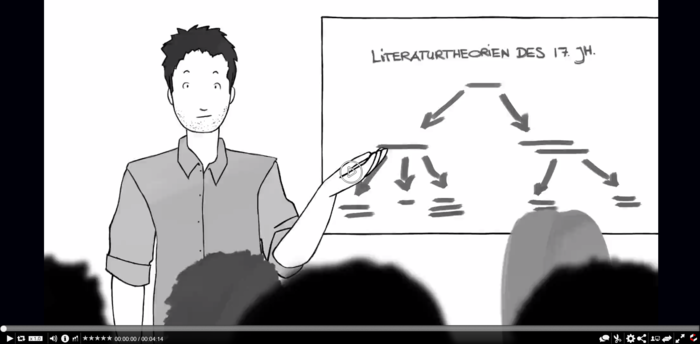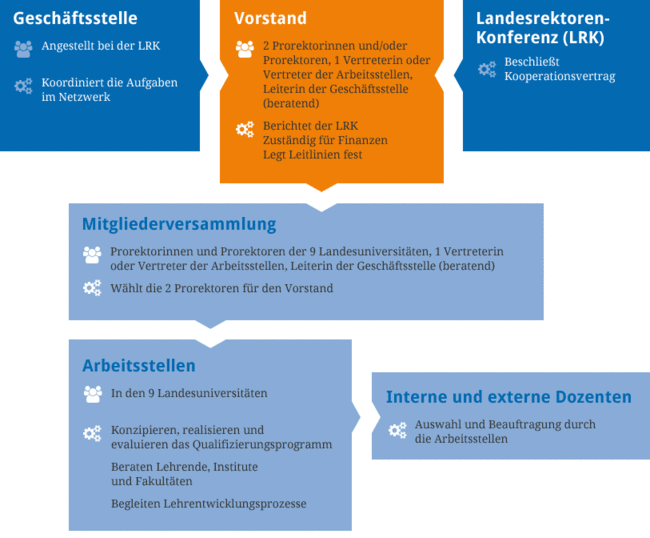Centre for Teaching and Learning BaWü (HDZ)
Info video on the HDZ

What is the HDZ Baden-Württemberg?
The Baden-Württemberg Centre for Teaching and Learning (HDZ) was founded in 2001 by the responsible State Ministry of Science, Research and Arts (MWK) and the nine state universities in Baden-Württemberg, and has been borne by them financially since 2007.
Every state university has an Educational Development Unit. Since 1 January 2019, the universities of education have been members of the HDZ with an Educational Development Unit at the Ludwigsburg University of Education.
The aim of the HDZ is to improve the quality of teaching and thereby increase the quality of studies for students. This dual objective is to be achieved through two complementary bundles of measures: through the expansion of a comprehensive range of further training opportunities in higher education didactics and through measures that serve to structurally improve the framework conditions for teaching.
The HDZ was successfully accredited by the Accreditation Commission of the German Association for University Didactics at the beginning of 2015. Re-accreditation took place in 2022.
The nine universities in Baden-Württemberg and the six universities of teacher education are jointly responsible for running the HDZ. Ten local offices and a central office work together as a network in the HDZ.
The responsible management body of the HDZ is the General Assembly, which is made up of the Vice Presidents for Teaching at the universities and a university of education. The HDZ Board of Directors is made up of these members and is elected by the General Meeting. They represent the HDZ externally.
You can find important information on the structure here.

- Freiburg
- Heidelberg
- Karlsruhe
- Konstanz
- Ludwigsburg
- Mannheim
- Hohenheim
- Stuttgart
- Tübingen
- Ulm
Since March 2015, the HDZ Baden-Württemberg has been accredited as meeting professional standards by the Accreditation Commission for Higher Education Didactics Training and Further Education Programs of the German Association for Higher Education Didactics (dghd).
According to the expert group, the documents and discussions show a convergent continuing education program across the locations in its basic outlines, which, however, offers sufficient scope for a locally specific design.
“The very positive findings in the self-evaluation report and the feedback from all stakeholders during the inspection are testament to the quality of this arrangement, which has not only served as a model for university didactics in Germany, but also offers a platform for further development. The Baden-Württemberg Certificate is completely on a par with the national reference framework and can also be seen internationally in terms of leading higher education didactic networks of 'Academic Development' ,” said the expert group in its final report.
The services of the HDZ are available to you if you are a
- Scientific employee or research assistant
- Assistant
- University lecturer
- Professor
- Lecturer
- Private lecturer
- Honorary professor
teaching at a university or university of education in Baden-Württemberg.
The services on offer at the HDZ are however not only aimed at individuals, but also at university units such as institutes, departments or faculties. As a representative of such a unit, you can request customized events or advice sessions from the HDZ.
Ba-Wü Certificate for Teaching and Learning at University Level
With the “Baden-Württemberg Certificate for Teaching and Learning at University Level,” the HDZ offers its participants a modular and self-contained training concept.
If you wish to acquire the Certificate for Teaching and Learning at University Level, you are bound by certain conditions. The certificate is modular and can be obtained part-time alongside your work. To this end, it offers a didactically and methodologically based combination of workshops, practical advice, and teaching observations and is oriented towards international standards with regard to its requirements.
The certificate comprises three modules with a total of 200 work units (WU) of 45 minutes each.
You can attend individual workshops first and, if you are interested, decide to acquire the certificate at a later date. Only at the beginning of the third module do you need to register in the form of an advice session at the local office of your university.
“Teaching and Learning” - Fundamentals of Teaching and Learning at Universities (60 WU)
In this module, you can sharpen your awareness of the conditions of teaching and learning at universities, systematically expand and reflect on your didactic and methodological knowledge and skills, and put your teaching and learning skills to the test:
- You will take part in the workshop “Fit for Teaching - Basics of Teaching and Learning at University Level” on the basic issues of teaching and learning (32 WU).
- Peer counseling: You will discuss challenges from your teaching practice with the other participants with the support of experts (12 WU).
- Collegial teaching observation: Forming a tandem, planning, and visiting each other in a 90-minute lesson (12 WU).
- You reflect and document what you have learned in Module I, what you have benefited from for your teaching and in which areas you would like to deepen what you have learned in Level II (4 WU)
Note on teaching practice in Module I: To make optimum use of all elements of the basic workshop and integrate them into your teaching, we recommend that you already have teaching experience and/or will be teaching courses in the foreseeable future.
Information on the site: Module I should be completed at the home university for organizational reasons.
Information on German language skills: This workshop and all elements of Module I in Hohenheim will be held in German. An English version of Module I is offered by the educational development units of the Universities of Heidelberg, Karlsruhe, and Freiburg. Workshop title “Fit for Teaching - Basics of Teaching and Learning at University Level.” You can register via the HDZ website here.
“Teaching and Learning” - specialization in selected subject areas (60 WU)
In Module II, you can deepen your knowledge of what is important to you in your subject and for your specific teaching tasks. You will attend one face-to-face course each from four of the following mandatory subject areas:
- Planning, designing, and running courses
Focus on skills-oriented teaching, planning, structuring, and varied course design as well as the targeted use of didactic methods and principles. - Advising, supervising, and assessing students
Advising and supervising students in courses, projects, internships, and final theses; designing and assessing assessments. - Evaluating and reflecting on teaching
Reflection and further development of own teaching, use of evaluation tools, consideration of individual framework conditions and resources. - Innovating and developing teaching and curricula
Addressing current challenges in university teaching, developing practical solutions – from individual teaching situations to curricular development.
“Teaching and Learning” - individual specializations (80 WU)
This module offers you the opportunity to set your own individual focus. You have the following choices (all in German):
- Teaching development project (up to 72 WU)
- Structure and curriculum development (32 – 72 WU)
- Product development for teaching (32 – 72 WU)
- Individual further development (up to 72 WU) with a choice between further development and reflection or portfolio.
Module III is accompanied in the following form: At the beginning, we clarify the module’s goals in a meeting and advise you on how you can achieve these goals. This advice session is a mandatory part of Module III, after which you carry out your plans. You then reflect on and document your project in writing. At the end, we evaluate the course and results of the module together.
